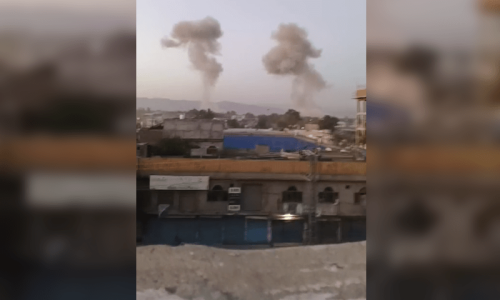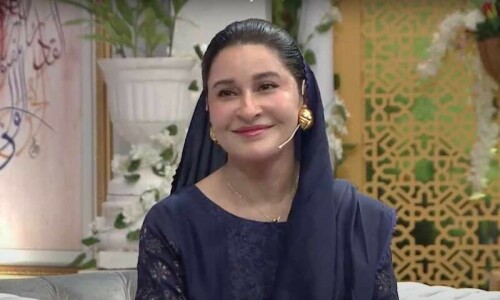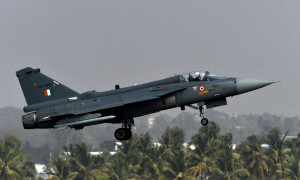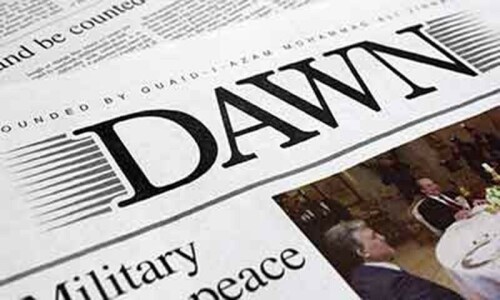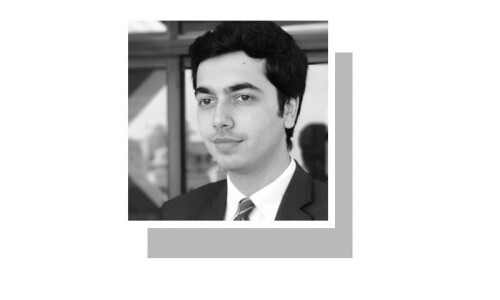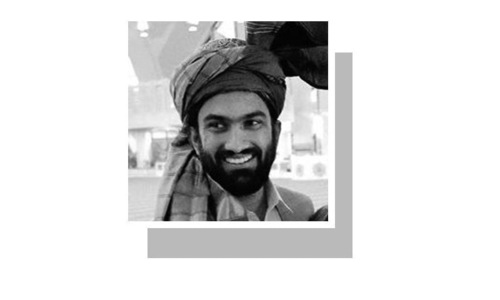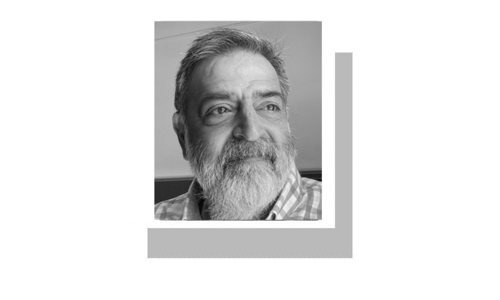IN a small house on the busy College Road in Township, a few Milli Muslim League men are entering details of each of the 170,000 voters from provincial assembly constituency PP-167 on printed slips to help them find their polling stations.
The slips will be distributed among voters during the ongoing door-to-door canvassing for Allah-o-Akbar Tehreek’s candidate Hafiz Khalid Waleed.
Outside, panaflex signage is being handed to volunteers for display on roads in different parts of the constituency, which mostly comprises lower to middle income groups, small traders, and government employees, as well as a significantly large number of Christians.
Hafiz Waleed is perhaps the only AAT ticket-holder from Lahore who is taking his campaign rather seriously.
In all, the AAT is contesting for five national and 12 provincial seats from the city.
The number of aspirants belonging to banned religious and extremist outfits competing in the July election is believed to be significantly large
“Our candidates are mostly poor people who don’t have enough capital like their PTI and PML-N counterparts. We’re relying more on our door-to-door canvassing and corner meetings. That’s why our election campaign is not so visible,” Khalid Waleed, the son-in-law of the banned Jamaatud Dawa’s chief Hafiz Mohammad Saeed, explains at his College Road election office.
The Milli Muslim League, the political front of the JuD, has entered into a sort of an alliance with the obscure AAT after the Election Commission of Pakistan refused to register it as a political party citing its links with Hafiz Saeed and the proscribed JuD. The US administration designated Hafiz Saeed a terrorist and put a $10 million bounty on him in 2012.
The AAT has fielded 265 candidates, including 13 women, countrywide. Apart from Hafiz Waleed, the other prominent AAT candidate is Hafiz Saeed’s son Talha Saeed who is in the run for a national seat from Sargodha.
Hafiz Waleed says the MML decided to use the AAT platform because the party wanted all its candidates from across the country to fight the election under one symbol.
“The ECP’s refusal to register us as political party left us no choice,” he says. “We approached a number of parties but none were willing to accommodate us for reasons you understand quite well.”
Founded in 2011 by Ehsan Bari, a graduate of the Nishter Medical College who has remained attached with the Jamaat-i-Islami and Jamiat Ulema-i-Islam in the past and contested an election on a Pakistan National Alliance (PNA) ticket in 1977, the AAT remained an unknown entity based in Bahawalnagar until the MML discovered it.
“Those fighting the election from the AAT platform were chosen and issued tickets by me,” Ehsan Bari told this correspondent by telephone. “Those who applied for an AAT ticket came to us after leaving their past behind. MML candidates are no exception. We gave tickets to only those who are true to the ideology of Pakistan and have no criminal case registered against them.”
“The ECP denied us our constitutional right. Yet we are in the race, aren’t we?,” smiles Hafiz Waleed, who is also assistant secretary general of the AAT.
Many believe that the country’s ‘establishment’ is backing new, small religious groups like the MML and the two factions of the Tehreek-i-Labaik Pakistan to break rightist voters away from the PML-N. Hafiz Waleed rejects this.
“The JuD always supported the PML-N in previous elections. However, we parted ways the day Nawaz Sharif changed his stance on Kashmir and relations with India. We couldn’t go to the PPP and we did not join the PTI because our cultures don’t match. That’s why we decided to form our own party and jump into politics to revive the two-nation theory,” he says.
The MML candidates may be running on AAT tickets but their election material doesn’t hide their true affiliation or the party they actually represent. “People are responding to our campaign because they know that we belong to the JuD and MML. We wouldn’t get so much response from voters if we introduced ourselves as just AAT ticket-holders,” argues a volunteer working for Hafiz Waleed.
The MML’s election campaign is based on two planks: the JuD’s role in Kashmir ‘jihad’ and the public services rendered by JuD under the banner of Filah-i-Insaniat Foundation.
The chances of MML men making it to the assemblies appear dim. But that doesn’t worry them. “We will know the results only on July 25,” says an MML worker. “Whether our people win or not doesn’t really matter. We are in it for the long haul. We got 6,000 votes after a campaign of just two weeks in the by-election against the PML-N’s Kulsoom Nawaz last year. We expect much better results in the general elections.”
The MML isn’t the only unregistered or proscribed group that is using a different platform to compete in the upcoming polls. A faction of the Ahle Sunnat-wal Jamaat, the political face of the banned Sipah-i-Sahaba Pakistan (SSP), for example, is in the electoral race from the platform of the Pakistan Rah-e-Haq Party. The Tehreek-i-Jafria Pakistan has registered its political front with the ECP as Islami Tehreek Pakistan (ITP).
The number of aspirants belonging to banned religious and extremist outfits competing in the July election is believed to be significantly large. While some are in the run on the tickets of “lawfully registered parties”, others like Maulana Mohammad Ahmed Ludhianvi, the head of the banned sectarian ASWJ group, is contesting for a national seat as an independent from Jhang.
Initially, his papers were rejected because his name was on the federal terror watch-list. But he was removed from the “schedule four” list of people with links to terrorism and his bank accounts unfrozen.
“We have 50 people contesting the elections for national and provincial seats from across Pakistan,” the Maulana tells Dawn by telephone. “Some are contesting as independent candidates and others on the tickets of different parties,” he adds. However, he refuses to name the parties that had issued tickets to ASWJ candidates.
Political commentators argue that banned outfits could not be in the electoral race without the backing of the powerful establishment.
“How else can you explain the removal of Maulana Ludhianvi’s name from the federal watch-list?” asks a political science professor of a public university. “Those who believe that the entry of groups and parties linked to proscribed outfits reflects on the eroding writ of the state authority are wrong. If it proves anything, it is the connivance of certain state elements with these groups.”
Published in Dawn, July 19th, 2018
















